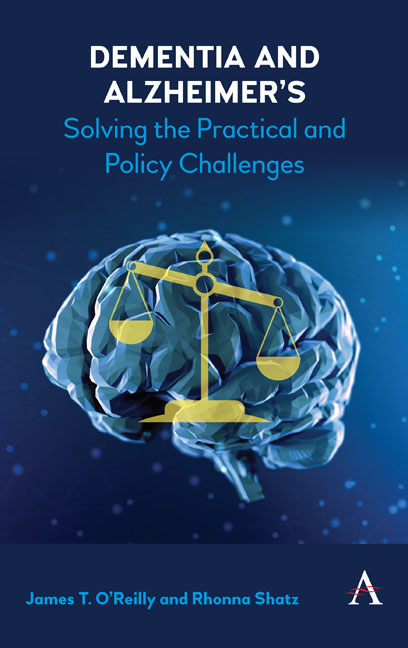Book contents
- Frontmatter
- Contents
- 1 Introduction
- 2 The family dynamics of dementia
- 3 Tort liability related to dementia
- 4 Dementia and private insurance
- 5 Medicare, Medicaid, disability and other government benefits
- 6 Dementia and residential care facilities
- 7 Adult protective services in dementia cases
- 8 Dementia and financial issues
- 9 Dementia in probate and guardianship
- 10 Dementia and employment issues
- 11 Drug research and new product developments for dementia
- 12 Dementia and criminal justice
- 13 Understanding your expert's advice about brain deterioration
- 14 Understanding the causes of Alzheimer's disease
- Appendix: Finding medical reference sources about dementia
- Index
14 - Understanding the causes of Alzheimer's disease
- Frontmatter
- Contents
- 1 Introduction
- 2 The family dynamics of dementia
- 3 Tort liability related to dementia
- 4 Dementia and private insurance
- 5 Medicare, Medicaid, disability and other government benefits
- 6 Dementia and residential care facilities
- 7 Adult protective services in dementia cases
- 8 Dementia and financial issues
- 9 Dementia in probate and guardianship
- 10 Dementia and employment issues
- 11 Drug research and new product developments for dementia
- 12 Dementia and criminal justice
- 13 Understanding your expert's advice about brain deterioration
- 14 Understanding the causes of Alzheimer's disease
- Appendix: Finding medical reference sources about dementia
- Index
Summary
Understanding connections
This chapter aids the reader in awareness of what may have caused the client's dementia, most frequently Alzheimer's disease. Our purpose is to explore what is known, what research is under way and what medical experts are likely to offer when lawyers ask them to explain the client/patient's dementia, its causes and its effects.
Importance of fundamental childhood networks
The default brain network ties together sensory processing to memory. Early sensory experiences are very crucial for setting up the brain's structure for robust, long-term memory development. A richly interconnected, efficient and redundant network at the beginning of life creates a structural and functional reserve that later in life can withstand the assaults of environment and aging on brain structures. Given the same amount of neuropathology, individuals with efficient networks and cognitive reserve will maintain function much longer and better than individuals with underdeveloped reserve. The biological imperative for early childhood experience is reflected in the innate drive of infants and children to explore their environment. Indeed, even in adulthood, the enrichment of daily routine with novel and varied experiences reduces the risk of dementia and an early sign of neurodegenerative pathology is apathy, a reduced drive to initiate and participate in novel pursuits.
Genetics drive some of the variability in basic network development. The genetic risk allele, apolipoprotein E4, is associated with reduced amount and function of brain synapses (neuronal connections) as compared to individuals with the E2 or E3 variants of this gene. This underdeveloped network will manifest as differences in school performance at early ages. In the Rush Religious Orders study ﹛Bennett DA, 2013 #294﹜, the complexity of grammatical structures and elaboration of thoughts in the entrance essays written at age 18 when the nuns entered the convent was decreased in those who later developed Alzheimer's disease. Education also influences brain development independent of specific genetic influences. In Portuguese families at the turn of the century, the eldest female in the family customarily stayed home to help with child rearing instead of going to school. At most, the eldest siblings could write their name or read a few words, but were otherwise illiterate.
- Type
- Chapter
- Information
- Dementia and Alzheimer'sSolving the Practical and Policy Challenges, pp. 111 - 128Publisher: Anthem PressPrint publication year: 2019



